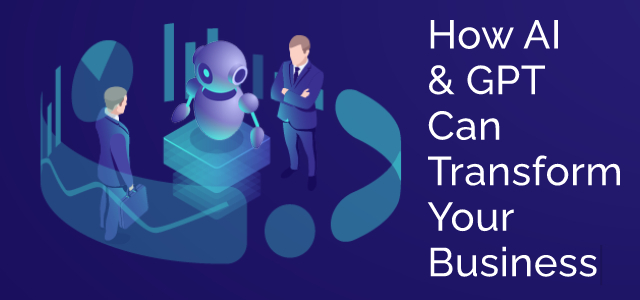How AI & GPT Can Transform Your Business
Estimated reading time: 6 minutes
During a recent Ad Victoriam “Salesforce Simplified” podcast, we spoke with Catalytics Founder – and noted data, analytics and AI expert – Frank Mendoza about the most heard acronyms in the universe today, AI (Artificial Intelligence) and GPT (Generative Pre-Trained Transformer), and how they are impacting – some even say disrupting – businesses today.
A little bit about Frank… He is a highly respected and award winning analytics leader with over 20 years of experience in strategy, customer experience and data science. He is the founder of Catalytics, which is a service company that helps fortune 500 companies like Nike, Kellogg’s, Keurig, Dr. Pepper and Jim Beam to execute actionable AI and data analytics strategies to solve their toughest business challenges. In addition, Frank holds a B.S. in mechanical engineering and an executive MBA from the University of Texas at Austin.
Here’s a few highlights from our chat with Frank…
Understanding the Types of AI
Like anything, it’s best to fully understand if there are different types of something. In the case of AI, Frank told the “Salesforce Simplified” podcast that there are three.
“There’s something called “Artificial Narrow Intelligence.” There’s something called “Artificial General Intelligence.” And then there’s even something called “Artificial Super Intelligence.” Super Intelligence, right now, is just theoretical at this point. This is where you have algorithms and things that start to learn more and better and can perform any task better than a human. It’s theoretical, it’s not currently available to us. Artificial General Intelligence is where it starts to perform as well as a human. It starts to interpret and can understand things, even to some extent, you know, start to make its own decisions based on very little input – have no input from humans. That’s right now, less theoretical, more and more attainable when certainly not available to us today, right? Artificial Narrow Intelligence is where we’re living. This is where everything from recommendation engines from Netflix, to the Generative AI solutions that ChatGBT and DALL-E and Midjourney offer, all play to these GPT solutions. Those are what’s considered Narrow Intelligence, meaning they can perform a specific task, but they have limited scope and fixed functionality. You know, you define a target, you start to collect information, it identifies patterns, and then makes a recommendation. And that’s where you start focusing on that narrow intelligence that we are today.”
Best Approach for Implementing AI and Data Analytic Strategies
We were curious about getting Frank’s recommendations for businesses when it comes to implementing strategies centered on AI and data analytics. He subscribes to “ taking an intentional approach to the solutions.”
“Right now, I think what you have is a lot of folks who are looking at a little bit of a shiny object syndrome,” Frank explained. “There’s so many cool things that are happening, but it’s really trying to understand what is your business objectives and goals? And then, how do we identify the best approach to go solve those, in some cases, Mike, as you can attain, you know, ascertain, there is you know, Generative AI may not be the right solution, it may be a discriminative AI, in some cases, based on your analytics, maturity, and where you are on your evolution of that journey. It may be simply reports and dashboards that you need at this stage in order to make better decisions. And so the best approach I found is not to go in there and assume that AI is going to solve the problem. I think the better approach is to approach it as what are the challenges that you’re currently undergoing, identify kind of the specific problems that are going to address those, and then define a hypothesis and then start to address that hypothesis, and determine whether or not these new emerging technologies like AI and Generative AI solutions are really going to help you achieve that or not.”
Differentiating Machine Learning and Deep Learning
In addition to AI, there’s two other terms that are being bantered about these days that may be confusing people: Machine Learning and Deep Learning. We asked Frank to set us straight on their differences.
“There is a lot of interchangeable use of these terms. And the reality is, AI is such a nebulous term right now; it’s very large. It’s a discipline, if you will. So, think physics, think chemistry, think mathematics. That’s AI, right? So, it’s this big, overarching discipline on which things are being bucketed. Right now, Machine Learning is a subset of Artificial Intelligence. Machine Learning is where you are feeding data, whether that data be, again, sound, it could be text, it could be structured data, like what you would find in a typical Excel spreadsheet, where rows and columns, but you’re feeding that data into this Machine Learning algorithm. And the algorithm is taking that and identifying patterns and using different algorithms to determine what’s the best approach to make an informed prediction. The Deep Learning is then a further subset of Machine Learning. Deep Learning is when you’re starting to take advantage of what’s considered neural networks. These are nodes that take into consideration weights and biases. It’s almost a bit of, you know, the analogy has been made to it works like a human brain, we’re not sure exactly how it works. But we know it takes different inputs, it attributes different weights against different parameters and attributes, and then makes a decision at the end of the day. It’s not exactly how the brain works. But it’s a good analogy to demonstrate how neural networks work. So, again, Artificial Intelligence is a discipline, Machine Learning is a subset of that discipline. And Deep Learning is a further subset of Machine Learning that leverages neural networks.”
Focus on Data First
Like it or not, companies know that at some point they will have to enable a strategic plan for incorporating AI into their day-to-day operations. Frank Mendoza says that data needs to be the main – and first -focus.
“Data is pivotal. What I like about the approach that Salesforce is taking right now is they have the data, right? When you’re talking about their CRM solutions, and the introduction of Tableau and other solutions, they have the data. And it’s really about aligning that data to your objectives, right? There are different data sources that are going to be available to an organization, everything from transactional data, customer data, master data, all these different data elements. So, what you really want to do is focus on what is the use case that you’re going after. And really identify the elements of data that are going to help you, you know, feed that algorithm to make those predictions. You know, in some cases, these Generative AI solutions, it’s going to be amazing. I think what you’re going to see here in the near future around personalization, is the ability to take an account within Salesforce, and really start to understand that client from a personal perspective and then targeted, very personalized messaging that can be crafted with really unique image sets and things like that are going to be amazing in the near future.”
We covered much more ground in our AI discussion with Frank Mendoza. You can listen to the entire podcast here.
How AdVic Can Help
Businesses need to carefully consider the challenges associated with AI and GPT before implementing these technologies. But not to worry, the AdVic Team is well-equipped to design your own personalized AI roadmap to success. If you have any questions, or are ready to get started today, book a meeting with us now.
Related Resources:
Harness the Power of Data with Salesforce Analytics Cloud & GPT-Powered Tools
Salesforce Introduces Generative AI Tools for Marketers
Decoding Salesforce: Unveiling the Messaging Behind AI+Data+CRM
Why Forecasting Sales with AI is Important Across All Industries
Subscribe to the AdVic Salesforce Blog on Feedly:



